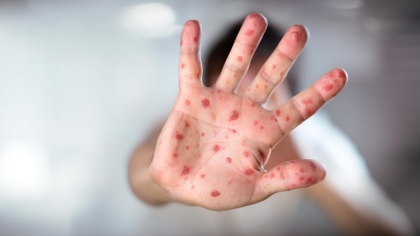Protecting Your Family from Measles Starts with the MMR Vaccine
Measles is a highly contagious viral infection that primarily affects children. Once widespread, it can now be effectively prevented with a simple, safe vaccine: the MMR (measles, mumps, and rubella) vaccine.
Also known as rubeola, measles spreads easily and can lead to serious—and sometimes fatal—complications, especially in young children. Globally, measles claims over 200,000 lives each year and is more contagious than both influenza and COVID-19.
In the United States, the majority of recent measles cases have occurred in individuals who were unvaccinated or unsure of their vaccination status. As of April 11, 2025, there have been 712 reported cases nationwide, with no confirmed cases in Nebraska.
"Vaccination is the safest and most effective way to prevent measles. Choosing not to vaccinate children puts them at risk for severe complications—including pneumonia, encephalitis and even blindness. Unvaccinated children also put other immunocompromised or young children at risk."
— Connie Novak, MD, Memorial Health Care Systems
Frequently Asked Questions About the MMR Vaccine
How effective is the MMR vaccine?
The MMR vaccine offers powerful protection:
- One dose is approximately 93% effective
- Two doses are approximately 97% effective
Most children who receive both doses are protected for life. In rare cases where a vaccinated individual contracts measles, the illness is typically mild and does not require hospitalization.
Can vitamin A treat or prevent measles?
Vitamin A cannot prevent measles. Under medical supervision, it may be used as a supportive treatment after infection. Most people receive sufficient vitamin A from a balanced diet that includes foods like carrots, bell peppers, broccoli, yogurt, chicken and fish.
Important note: Excessive vitamin A supplementation can lead to toxicity. Always consult a healthcare provider before taking supplements.
Is natural immunity better than vaccination?
No. While natural infection can sometimes lead to long-term immunity, it comes with serious risks. For example, illnesses like Haemophilus influenzae type b (Hib) can cause permanent hearing loss, brain damage or death. Vaccination provides strong protection—without the dangerous consequences of infection.
Do vaccines cause autism?
No. Extensive research has found no link between vaccines and autism. The original 1998 study that raised concerns was thoroughly discredited and retracted due to fraudulent data and flawed methodology.
Ready to Protect Your Family?
If you have additional questions or need to schedule a vaccination appointment, contact your Memorial Health Care Systems provider. We're here to support your family’s health every step of the way.

